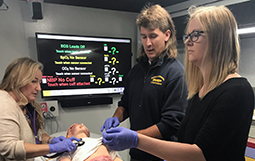Together with Wake Forest Baptist Medical Center, NASCAR great Richard Childress and his wife, Judy, launched the Childress Institute for Pediatric Trauma. According to the institute’s website, when Richard and Judy discovered that traumatic injury was responsible for the death of more children in the U.S. than all other causes combined, they were inspired to take action. So they set a goal of helping save the lives of injured children throughout the U.S. and around the world.
On May 10, 2017, the institute partnered with the Eddie Smith Foundation to create and fund a study to address pediatric trauma care at Vidant Medical Center. Eddie Smith, a Greenville resident and owner/CEO of Grady-White Boats, is a generous benefactor of Vidant Health. In fact, the Eddie and Jo Allison Smith Cancer Tower is named for him and his wife.
The funded study is titled “Saving Children in Rural America: The Impact of a Mobile, Simulation-based Educational Outreach Initiative on Pediatric Trauma Care and Outcomes in a Rural Trauma System.”
Awarded $250,000 over two years, researchers at Vidant collaborated with East Carolina University’s (ECU) Brody School of Medicine (BSOM) to build a mobile simulation. The goal of this work is to increase pediatric trauma education and readiness for regional healthcare providers in eastern North Carolina. This practical, hands-on experience builds skills and confidence in those who respond to and care for children involved in trauma.
Recently, the simulation truck visited Outer Banks Health. Throughout the morning, physicians, advanced-level practitioners, respiratory therapists, and nurses participated in mock emergency situations based on goals and objectives determined by Eric Toschlog, MD, FACS, FCCM, chief of trauma surgery at ECU BSOM. Participants were videotaped, and at the conclusion of the case, the tape was reviewed and Toschlog led a discussion highlighting successes and opportunities.
Later in the day, EMS workers were also able to experience the simulator in the front portion of the truck that is designed to resemble an ambulance interior.
Matt Chovaz, MD, medical director of the emergency department, who was instrumental in getting the simulator to TOBH, noted, “It is great that we have this resource available to us. Being able to provide the best care possible, including to children, is always the goal at Outer Banks Health,” said Chovaz.
The simulator truck is operated by David Schiller, operations manager, simulation specialist, EMS; J. Bryan Lake, BS, BSN, RN, trauma outreach coordinator, trauma and acute care surgery; and Tyler Mathews, ECU, simulation specialist


